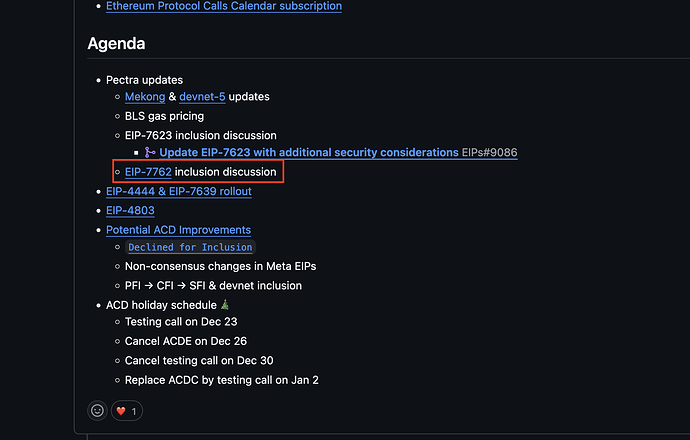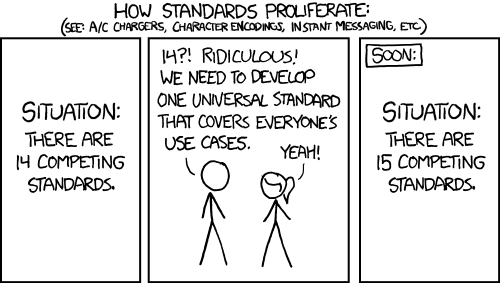Reference: https://x.com/philngo_/status/1864695365775052940
Related to: AllCoreDevs, Network Upgrade & EthMagicians Process Improvements
Problem:
During ACDE #201, I observed a clear gap in understanding the actual consensus required to support or object EIP inclusions. There is no clearly defined expectation of where contributors (new or existing) post sentiment/opinions on EIP inclusion for decision making.
Additionally, we lack communicating how non-L1 contributors can signal their support or objection to EIP inclusion except through participation on ACD calls where there isn’t a clear expectation for stakeholders to be present for decision making.
Goals of this thread:
- Maintain integrity of the ACD process
- Maximize productive conversation of a limited coordinated timeslot
- Gather actual consensus from all stakeholders (not just client teams/researchers on ACD), such as consumers and builders of which the EIP affects downstream (via Breakout calls or other coordination processes such as RollCall)
- Have a soft/hard expectation for all members of the Ethereum community on how to participate in the EIP inclusion process and their interactions with ACD
Questions
The following are questions I believe we should be able to answer as ACD participants. Akin to a “Frequently Asked Questions” about how contributors should collect, present and advocate for or against EIPs.
Where should contributors coordinate their support?
We currently have scattered platforms of information and it is not clear where “official” stances of teams should be posted for efficient and accurate consensus gathering. The scattered platforms of information are mainly: EthResearch, Ethereum Magicians, Twitter, Discord, Github (e.g. Breakout calls / L2 coordination calls) and client team blog posts.
-
There should be some expectation of aggregating high signal information into one place for signalling sentiment, especially when we expect to make decisions on EIP inclusion. This to me feels like EthMagicians and requires buy-in from the community.
-
What is the purpose of each platform? Here is my best guess:
- EthResearch: Data collection and presentation, theoretical research, protocol ideas
- EthMagicians: Persisted debates/opinions of EIPs and coordination processes for easy access and discovery. There needs to be a better way to curate support/opposition if threads get too long.
- Twitter: Communicating ideas/research to a larger platform and audience
- Discord: Instant messaging for public discourse on R&D and coordination topics
- Github (
ethereum/pm): Scheduling and Agenda planning. Perhaps ACD agendas should incorporate hard commitments to ACD decisions so the relevant people can show up or leave support in thread - Github (
ethereum/*-spec): Continuous integration of shared specifications for implementors and discussion on spec-related implementation details. - Client team blog posts: Signal official stances of client teams in support or opposition of ACD proposals.
What should ACD timeshare be used for to maximize signal while minimizing noise?
Here are some examples:
Encouraged:
- Updates to ongoing initiatives (e.g. Devnets, client implementations)
- Scheduled decision making on PRs for implementors
- Scheduled decision making on EIPs with relevant stakeholders present
- Providing summaries of decisions from breakout rooms and coordination calls (e.g. RollCall) related to ACD decision making
- Planned presentations where time permits
Discouraged:
- Highly specific technical debates that require more time/data/participants.
- Bringing in new PRs/EIPs which were not scheduled for decision making
Which meetings should I attend?
Contributors are highly encouraged to join relevant breakout sessions and regularly participate in the coordinated call which best fits their topic. E.g. Rollups should participate in Roll Calls, Verkle implementors should participate in Stateless Calls.
There should be an expectation that when an ACD agenda topic is relevant to your team/topic, you should have a representative at the ACD call, especially if decisions are scheduled to be made.
These are just some basic questions, but I feel like it would be beneficial to all stacks of the Ethereum community to have an expectation on how they can fairly participate and provide an effective feedback loop to Core Devs on decisions that affect everyone.
In the case of the example used in ACDE #201 and for decision making on EIP-7762, my two cents is that EIP-7762: Increase MIN_BASE_FEE_PER_BLOB_GAS - #5 by benaadams seems like the proper place to voice support/opposition in ACD along with aggregated links to data such as:
- https://research.2077.xyz/eip-7762-eip-7691-making-ethereum-blobs-great-again
- On Blob Markets, Base Fee Adjustments and Optimizations - Sharding - Ethereum Research
And relevant PRs such as:
If there was an expectation to make a decision on inclusion, it should’ve been on the agenda so that L2s have an opportunity to support it with representation in the call, alongside others (maybe more than just lightclient) who opposed. If the debate became too long, it would’ve further supported the need to move the discussion to RollCall #9.

